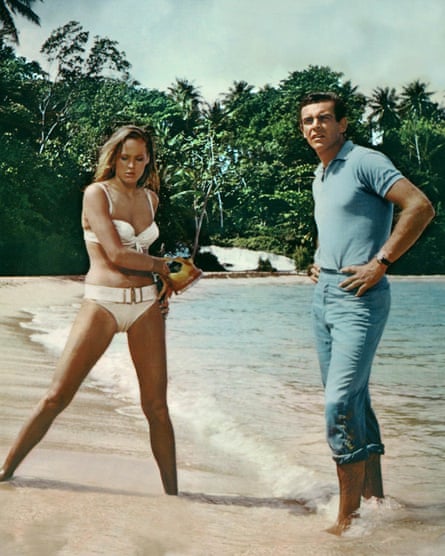 |
| Sean Connery Photo by Cynthia Gould |
'He defined an era and a style': film world mourns Sean Connery
The Scottish actor enjoyed a long and varied career but will for ever be associated with the role of James Bond
Vanessa ThorpeSaturdady 31 October 2020
Sean Connery, one of Britain’s greatest screen stars, has died at the age of 90. The Scottish actor, forever linked with the role of James Bond and regularly saluted as the best to play the famous part, was mourned by the entertainment industry and his many fans on Saturday as the news broke.
Nicola Sturgeon, Scotland’s first minister, said she was “heartbroken” to learn of the loss of the actor, also one of the most prominent campaigners for an independent Scotland: “Our nation today mourns one of her best loved sons. Sean was born into a working-class Edinburgh family and, through talent and sheer hard work, became an international film icon and one of the world’s most accomplished actors.”
Dame Shirley Bassey, who sang the theme to Goldfinger, spoke of her fond memories of watching him play football, adding: “Well, I will always be there to cheer you on, Sean!
The former milkman, who was born in August 1930 in Fountainbridge, Edinburgh, and who once danced on stage as a young man in the chorus of the musical South Pacific, was hailed by Daniel Craig, his latest successor in the Bond role, as a man who “defined an era and a style”.
“Sir Sean Connery will be remembered as Bond and so much more,” said Craig. “The wit and charm he portrayed on screen could be measured in megawatts; he helped create the modern blockbuster. He will continue to influence actors and filmmakers alike for years to come.”
Even the family of the late Sir Roger Moore hailed Connery as the “best Bond ever”.
Connery’s ability to convey a combination of grit and sardonic charm has seldom been equalled – except perhaps by the great stars of classic Hollywood, such as Humphrey Bogart or Robert Mitchum. In Dr No, From Russia With Love and Goldfinger a cinematic giant was born.
Connery inhabited the role of Ian Fleming’s stylish and callous MI6 operative from 1962 to 1971 – interrupted by George Lazenby in 1969 – ensuring the 007 franchise took hold of the public imagination. He returning in 1983’s ironic Thunderball remake, Never Say Never Again.
But while the image of Connery’s Bond throwing his trilby on to a hatstand while sidling up to Miss Moneypenny will always be difficult to beat, the actor made his mark in a succession of other films that have also stood the test of time. Alfred Hitchcock’s disturbing 1964 thriller Marnie, in which he appeared with Tippi Hedren, remains a favourite for modern audiences, as does The Man Who Would Be King, a 1975 military adventure he filmed alongside the other great British film idol of the era, his friend Michael Caine, an actor who rivals Connery as one of the most popular go-to impersonations for vocal impressionists.
A small schoolboy, Connery shot beyond 6ft at 18, earning himself the nickname “Big Tam”. He joined the Royal Navy at 16, serving for three years and so earning special licence to later play Bond, a naval commander. The young Connery also worked as a swimming pool attendant, and took up competitive body building and male modelling before focusing on the stage, after helping out backstage at Edinburgh’s King’s theatre.

When Bond brought him stardom it proved a faithful friend, although Connery’s life was occasionally controversial. He was derided by some Scots for his vocal nationalism despite his decision to live far from his homeland. His personal life and attitudes were often found wanting as well.
Remarks he made in a 1965 interview with Playboy argued that violence to women could be justified and caused many to denounce him as an abuser. “I don’t think there’s anything wrong with hitting a woman – although I don’t recommend doing it the same way you’d hit a man,” he was quoted as saying. Connery was also directly accused of domestic violence in 2006 when his former wife Diane Cilento, mother of actor Jason Connery, accused him of abuse in her autobiography.
A subsequent long marriage to Micheline Roquebrune, a fellow golf enthusiast he met in Morocco, was happy, although briefly troubled when an affair with the singer Lynsey de Paul became public knowledge.
For many film critics, among Connery’s most important screen work was seen in the sombre British film noir The Offence, directed by Sidney Lumet and released in 1973. Other celebrated roles in hit films include the screen adaptation of Umberto Eco’s The Name of the Rose and Highlander, both released in 1986, and the gangster drama The Untouchables, which won him an Oscar in 1988. He also made a number of big-budget films, including Outland, set in a space mining colony, and submarine thriller The Hunt for Red October.
Many of those mourning Connery this weekend spoke of his fatherly cinematic presence, notable in such parts as King Arthur in First Knight and as an ageing Robin Hood opposite Audrey Hepburn in Robin and Marian. Perhaps most poignant to recall today is the death scene and miraculous return to life he performed as Harrison Ford’s father in Steven Spielberg’s Indiana Jones and the Last Crusade in 1989.


No comments:
Post a Comment